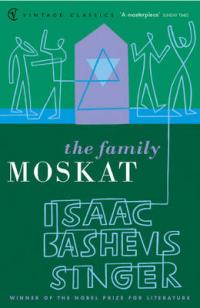The Family Moskat is an awesome achievement worthy of any of the great Russian 19thcentury classics. The novel realistically re-creates the world of East European Jewry before the Second World War, taking the reader back to another time, place and culture. The food, humour, religious beliefs, personal failings and hopeless struggles of a large, sprawling family are all vividly brought to life in this living book.
This novel crossed my path while browsing the dusty shelves of the local Op Shop. While I deal in new books every day, it’s an occasional hobby of mine to rescue tattered classics and literary curios from the dustbin. The conservative Catholic writer and critic G. K. Chesterton put this nicely in a piece he wrote against waste in his essay collection What's Wrong with the World.
‘Thrift is poetic because it is creative; waste is unpoetic because it is waste. It is prosaic to throw money away because it is prosaic to throw anything away; it is negative; it is a confession of indifference; it is a confession of failure...If a man could undertake to make use of all the things in his dustbin he would be a broader genius than Shakespeare.’
And so, for a couple of coins, I took home my first Isaac Bashevis Singer novel.
Even though Isaac Bashevis Singer has a huge reputation, he’s not someone I’d ever had on my ‘must read’ list. A Polish Jew who emigrated to the United States and wrote all his work in Yiddish, he sounded about as lively as a Bergman film. But the blurb on the back really grabbed me: “In this epic novel, Isaac Bashevis Singer re-creates a vanished world: the colourful, hermetic society of the Eastern European Jews, from the turn of the century to the time of Hitler’s invasion.”
The novel opens with the Moskat Family’s grand patriarch Reb Meshulam Moskat, who at the age of 79 has re-married for the third time. The next chapter introduces Asa Hershel Bannet, a young intellectual who obsessively reads the Jewish philosopher Spinoza. He should have the world at his feet, but is plagued by self-doubt and uncertainty. Trying to come to terms with the volatile politics of the times and struggling to find his place in a complex and beleaguered Jewish culture, with its internal tug of war between modernity and orthodoxy, Asa Hershel epitomises the many impossible struggles that confront East European Jews in the time leading up to the coming to power of the Nazis.
Most of The Familly Moskat’s 600 pages reads like an emotionally messy family history. The novel chronicles several generations of the Moskat family, their marriages, affairs, deaths, financial dealings, petty crimes, religious and spiritual beliefs and their quickly diminishing status in Polish society. By the last page Polish Jews are scattering in all directions as severe danger and death loom with the Nazi advance. The novel is like watching a great culture and civilisation sink into the ground (there is much rich description of Jewish life, to the point where you want to travel back in time and place to experience it for yourself).
The descriptions of anti-Semitism are interesting too. The anti-Semitic taunts and slanders seem so childish and stupid. The Jews are blamed for everything, and so anti-Semitism seems like so much magic thinking. In the end anti-Semitism would not only kill millions of Jews, but almost destroy Germany itself.
This is an utterly awesome novel. Every page bounces with life and vivacity. The dialogue leaps off the page and is worthy of Dostoyevsky and Gogol. While the subject matter may sound dark and depressing, there’s plenty of blunt humour and irony. Even though I have no idea what it would be like to live as a East European Jew before the invasion of the Nazis, The Moskat Family reads like a testament to the times from someone who was deeply immersed in it. It has such a visceral feeling of truth that it leaves you shocked. It’s like watching a people who know they are doomed try to escape death and horror. The worst of it is no amount of reasoning with war and racism can procure fair treatment for Polish Jews. The last page, where several of the main characters are left absolutely cornered and in grave danger, leaves you with a horrible feeling of helplessness.
The Family Moskat, by Isaac Bashevis Singer. Published by Vintage Classics. ISBN: 9780099285489 RRP: $12.95

No comments:
Post a Comment